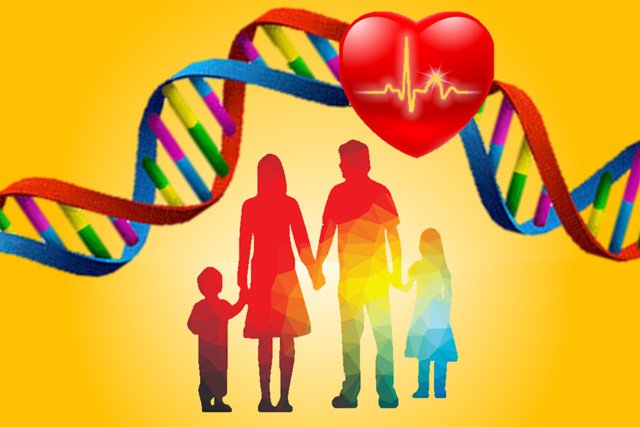
The most common cause of sudden cardiac death is an abnormal heart rhythm that causes the heart to immediately stop pumping.
Sudden cardiac arrest is distinct from a heart attack during which the heart muscle is damaged but the heart tries to keep pumping.
Tragically, sudden cardiac arrest can strike teenagers and young adults before any other symptoms appear.
Enlarged hearts are often caused by excessive alcohol, certain diseases, and drugs.
However, if such risk factors are not present, the most likely cause is a mutation (a mistake in a gene).
Importantly, in some people, instead of causing sudden death, the same mutation causes the heart to enlarge and the heart muscle to become weak.
This occurs if either the heart muscle thins, or thickens, too much (respectively called dilated or hypertrophic cardiomyopathy).
The enlarged heart can cause detectable symptoms such as being easily tired and out of breath. These conditions are often diagnosed with tests such as an echo cardiogram.
In recent years scientists have uncovered a host of mutations that can cause enlarged hearts and sudden cardiac arrest. Importantly, such mutations are expected to be found in about 50% of the patient’s children and siblings.
These mutations are hidden warnings of sudden cardiac arrest. To uncover these warnings we first identify the mutation causing the enlarged heart in the initial patient.
Next we can test family members for that specific mutation. Those found to have the mutation can then be treated to avoid sudden death, e.g. with drugs and/or an implanted defibrillator.
Mutations can be identified by clinical genetic sequencing of a panel of genes currently associated with the disease. Companies such as Invitae, GeneDx or Color specialize in such testing.
This clinical sequencing can be ordered for you by your doctor and determines all the thousands of letters in each tested gene. This is distinct from the handful of letters that are determined by popular genetic sequencing companies that you can sign up for without a doctor, such as 23andMe or AncestryDNA.
In my laboratory at the University of Nevada, Reno, we are studying a specific mutation shown to cause sudden death and dilated cardiomyopathy (DCM).
This mutation is specifically found in people with Ashkenazi Jewish ancestry and not in other genetic groups. Since the frequency of this mutation is high in Ashkenazi Jews, we think it may be a major cause of DCM/sudden death in Ashkenazi Jews.
We are currently recruiting participants to test this hypothesis.
Genetic testing of persons with unexplained dilated or hypertrophic cardiomyopathy is currently standard care and is often covered by insurance. To protect their families, such patients should ask their doctors about genetic testing.
This is especially important for patients diagnosed before such testing was widely available. Also since new genes that cause these conditions are being identified at a rapid rate, patients should repeat genetic testing every few years until their likely mutation is identified.
Susan W. Liebman is currently a research professor in the Department of Pharmacology at the University of Nevada Reno. She is also a Distinguished Professor Emerita at the University of Illinois at Chicago where she was a professor in the department of biological sciences for 34 years. Dr. Liebman’s research has used the model eukaryote yeast to answer compelling genetic questions, e.g. she has used yeast to investigate the nature of infections “prion” proteins. Yeast genetics has been a gateway to human genetics. Currently, Dr. Liebman’s research is focused on human disease associated proteins and human genetics.



